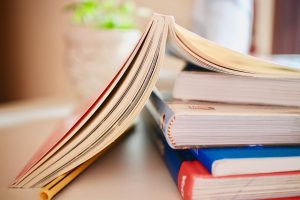By Caroline R. Castle
If it is true, as the old saying goes, that “clothes make the man,” we could readily say that “words make the reporter.” Words are our stock in trade, our raison d’être. It falls to reporters, then, to have more than a passing acquaintance with the English language and with the meanings and spellings of as many words as possible. While it is true that we can report anything phonetically, the trick lies in transforming our soundalikes into sensible speech on the page. To do this well requires that we develop the kind of working knowledge of words that is derived most effectively from in-depth reading, an increasingly lost art.
Students, especially, should be concerned with expanding their vocabularies. As a reporter with 30-plus years’ experience and a veteran of proofreading, I know the impression that is created when an attorney sees a misused name or word on the page. When reporters transcribe elude instead of allude, for instance, they are announcing to the client that they are unfamiliar with these rather commonplace terms. To avoid such errors, students should begin now to create and maintain good reading habits. Only constant and repeated exposure to words of all stripes develops confidence in lexicological skill.
 This is important for two reasons specific to accurate court reporting. Familiarity with the meaning of many words will, one, allow the reporter to follow and transcribe verbal speech accurately; and, two, increase spelling skill. Reporting softwares now include many aids to enhance accuracy. Even so, spell-check cannot solve all ills and is no substitute for knowledge. The reporter is always the final arbiter of the transcript and must take responsibility.
This is important for two reasons specific to accurate court reporting. Familiarity with the meaning of many words will, one, allow the reporter to follow and transcribe verbal speech accurately; and, two, increase spelling skill. Reporting softwares now include many aids to enhance accuracy. Even so, spell-check cannot solve all ills and is no substitute for knowledge. The reporter is always the final arbiter of the transcript and must take responsibility.
What, then, should we include in a reading regimen designed to promote tip-top professionalism? First, it is important to realize that any reading helps: fiction, nonfiction, periodicals, and newspapers. Some reading should be undertaken every day, before or after class. Newspapers and journalistic periodicals are particularly helpful, as they convey not only a general knowledge of words but also of newsworthy events in the world. It is vitally important to have an awareness of current events because it is impossible to predict what may emerge from someone’s mouth at any given moment. Names and places in the news regularly figure in testimony, and you stand a much better chance of reproducing accurate subjects about which you have even a modicum of understanding. This is particularly true when it comes to any technical field — medicine, science, business — but also extends to politics, culture, philosophy, and even religion. So grab a newspaper or a magazine and get busy.
Periodicals that run essays and book reviews are particularly helpful. They are usually associated with cultural, political, or economic life. Harper’s, The Atlantic, and National Review are three that come to mind that are most useful in this respect. The New Yorker is also excellent. Do not be put off by the particular political points of view espoused by such publications; what you are reading for is wealth of language.
Weekly current events periodicals are also very helpful. The best known of these are probably Time, Newsweek, U.S. News & World Report, and The Economist. If you want some lighter reading, try Reader’s Digest. Along that line, regularly completing the “It Pays to Increase Your Word Power” quiz in Reader’s Digest is a great way to enhance your vocabulary.
A word of warning regards the use of the internet to check unfamiliar words: Make certain you have a good dictionary and a thesaurus as well as other reference materials such as Physician’s Desk Reference, a medical dictionary, and a legal dictionary that can be tapped to verify specific terms. Again, as with spell-check, the internet does not solve all ills. If you have a mind full of information upon which to draw, you are better prepared to face the many puzzles you will confront in your writing.
Of course, in addition to current publications, the more books you read, the better off you are. I tend to favor nonfiction — political content and biographies are excellent — but high-quality novels and literature are very useful indeed. If you are perusing the book reviews, you will undoubtedly find many of the new releases interesting and will wish to read them, further exposing yourself to the written word.
Finally, although it does not exactly fall into the category of reading per se, solving word puzzles promotes a nimble mind. Mid-level difficulty crosswords are excellent for developing vocabulary, spelling, and a general knowledge base. Doing the jumble puzzle in your newspaper provides both a good feel for how words are comprised as well as an increasingly sharp recognition of prefixes and suffixes. And always, if you encounter an unfamiliar word in puzzling or reading, please stop and look it up to make the word a permanent part of your vocabulary arsenal.
Emulate Shakespeare, who achieved excellence using an invaluable tool: richness of language. Use this same tool and achieve excellence yourself.
Caroline R. Castle, RDR, CRR (Ret.), is a retired court reporter in Rapid City, S.D. She can be reached at bluish5746@hotmail.com.










